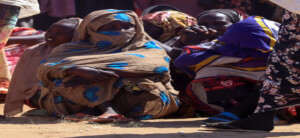Haemorrhagic fever, cholera spreading in Sudan as reports of chikungunya wane
The Ministry of Health has reported 22 suspected cases of haemorrhagic fever in Kassala in eastern Sudan.
 Kassala hospital (File photo)
Kassala hospital (File photo)
The Ministry of Health has reported 22 suspected cases of haemorrhagic fever in Kassala in eastern Sudan.
In a press statement, the director of emergencies and epidemics, Emtiaz Ata, told reporters that the ministry is examining suspected cases to make sure of the suspicion and to find out more about the disease.
The Director General of the Ministry of Health, Nureldin Hussein said that the health situation in Kassala is not reassuring; and there must be measures and considerable precautions to adequately address the health issue and avoid epidemics. Further, he confirmed the state of Kassala is “free from chikungunya fever” because of vector control.
Chikungunya fever
Chikungunya fever is spread by the Aedes aegypti mosquito, the same kind that spreads dengue and Zika virus. It is characterised by an abrupt onset of fever, frequently accompanied by joint pain.
There is no specific antiviral drug treatment for chikungunya. Most patients recover fully within weeks, but in some cases joint pain may persist for several months, or even years. With older people, the disease can contribute to the cause of death.
Poor sanitation
Poor sanitation and contamination of drinking water are blamed for the spread of the mosquitoes.
As reported by Radio Dabanga in February, a government report showed more than 10,000 cases of chikungunya fever in Sudan’s Red Sea state over four months. In November 2018, Radio Dabanga reported a rise of rates of chikungunya fever infections in eastern districts of Port Sudan in Red Sea state.
An outbreak of chikungunya began in August 2018 after heavy rains hit Sudan’s eastern Kassala state and El Gash river flooded large pieces of land. In October, health sources told Radio Dabanga that the number of patients admitted to health centres and private clinics in the eastern Sudanese state was increasing. Government officials reported at the time that at least 13,400 people in Kassala were infected with the mosquito-borne disease.
Cholera
In Blue Nile State, up until 17 September, the total number of cholera cases has reached more than 100. The Blue Nile Doctors Committee announced that these cases have been recorded in El Roseires Hospitals, Ed Damazin Educational Centre, El Serio, Wad El Maha, and El Reefin. Gony the Health Centre in the north of Ed Damazin, has received new cases that occurred in other areas.
Malaria
In North Darfur, the Sudan’s Central Doctors Committee of North Darfur has recorded 565 cases of malaria during the months of July, August and September in Kabkabiya rural hospital.
In a report, the Committee confirmed that the number of patients during the month of September has reached 164, while the number of cases in August was 213, and in July 188.
However, the committee has clarified that these do not include the number of cases that have been registered or diagnosed in private clinics, private centres, and health insurance in Kabkabiya. The Committee has appealed to the State and Federal Ministry of Health to put efforts in place, and provide effective measures to reduce the spread of the disease.
West Kordofan
In West Kordofan, the Forces for Freedom and Change has demanded the removal of the director general of the Ministry of Health and investigating him to find out the circumstances concerning the deterioration of the health sector in the state, the reasoning behind closing of some hospitals and health centre.
Yesterday, the state’s FFC, represented by the Sudanese Professionals Association (SPA) condemned in a statement the practices of the director general of the Ministry of Health, including discharging of medical personnel from the state, interrogating and threatening to dismiss them.
The memorandum explained that these practices have caused some of the medical cadres to strike, and others decided to leave their work in El Muglad and led to the closure of the El Muglad Margate Hospital and health insurance centres in the state, including centre No. 6 in El Muglad, and Siteib health centre.
Therefore, the memorandum demands the immediate dismissal and investigation of the Director-General of the Ministry of Health, and all those responsible for the deterioration of the health sector in the state. Also, memorandum asks for the restructure of the Ministry of Health in the state that competence and review of certificates of workers in the health sector can be the primarily basis of selecting individuals.
Radio Dabanga’s editorial independence means that we can continue to provide factual updates about political developments to Sudanese and international actors, educate people about how to avoid outbreaks of infectious diseases, and provide a window to the world for those in all corners of Sudan. Support Radio Dabanga for as little as €2.50, the equivalent of a cup of coffee.












 and then
and then